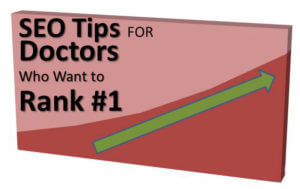To put search engine optimization in perspective and understand SEO, it is important to understand why people search. Google processes 3.5 billion searches per day. People search to find information, buy a product/service, access cloud applications, play music/games, etc. Today’s smart devices allow people to search on the go. You can set an alarm, order a product or listen to music by simply speaking to your phone, ipad or home device.
It’s easy to see the vital role that Internet plays in our world. As a doctor or medical spa owner, you need excellent SEO to appear in local search results. PUMC blogged previously about optimizing your online visibility. Today, we are covering some common SEO terms. Since Google has the largest share of searches, we’ll use it in our examples. However, the SEO terms below apply to all Internet search engines.
Common SEO Terms for Searches

- Algorithm is a combination of computer programs used by search engines. These rank website content for search results. Your SEO approach needs to transition as ranking factors change.
- Analytics is a web program that tracks audience traffic and behavior on your website. Engage an experienced website designer to discuss reports with you on a regular schedule.
- Bounce Rate is the percentage of people visiting one website page and leaving without visiting another page. While this may not be a content or website issues, investigate potential causes.
- Broken Links happen when a web page that you linked to is not valid. This is often due to a website that is offline, deleted or has URL changes.
- Click-Thru-Rate is the percentage of users clicking on an organic search result.
- Domain is your URL. When using excellent SEO techniques, your website builds strength consistently over time.
- Page Rank is the importance of a specific web page that Google assigns. Links, page speed, content, mobile friendliness and SEO all play a role in your website rank. Google says its algorithms rely on more than 200 ranking factors.
SEO Terms for Content and Advertising
- Competition is someone selling similar products/services. Medical practices usually compete for the same keywords in organic and paid Internet searches.
- Conversion is the percent of website visitors completing the desired action such as buying, registering or contacting you.
- Long-Tailed Keywords are keyword phrases that usually consist of 3+ words. For example, you can rank more easily for the long-tailed keyword phrase “Botox units for frown lines” than for the keyword “Botox”.
- Pay Per Click (PPC) is paid keyword advertising that appears in a prominent position along with organic search results. Combining excellent PPC an SEO results in better search results and conversions.
The SEO map is constantly changing. So, choose an agency that specializes in online visibility for your industry. While we discuss these few SEO terms with our clients, many more factors help keep them on Page 1 search results. Contact us for a complete analysis of your online visibility and reputation vs. your competition. We’re here to open the door for your patients.

Leave a Reply
You must be logged in to post a comment.